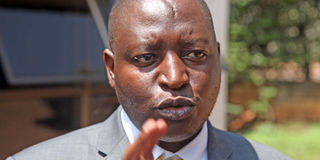Uganda to host Africa population conference

Mr David Bahati, the State Minister for Finance in charge of Planning
What you need to know:
- The conference will be marked under the theme “Harnessing Africa’s population Dynamics for sustainable Development: 25 years after Cairo and Beyond”. The first conference was held in Senegal in 1988 while the last conference was held in South Africa in 2015.
Government together with the Union for African Population Studies is set to host the 8th African Population Conference next month.
The conference, scheduled for 18-22 November in Entebbe, is held every four years with the aim of sharing and disseminating scientific information on key population, health and development issues facing the continent.
Addressing journalists at the Uganda Media Centre in Kampala on Thursday, Mr David Bahati, the State Minister for Finance in charge of Planning, said the conference is an opportunity for networking and sharing knowledge with researchers, policy makers, public health experts, among other stakeholders in the field.
Mr Bahati said Africa’s demographic dynamics were shaping its present and future development agenda, and must be harnessed.
“Africa in general is a very young continent. About 40 per cent of the population is below 15 years of age, and an additional 30 per cent fall between 15-24 years. This demographic profile presents a unique opportunity to achieve massive social economic transformation through harnessing the demographic dividend,” he said.
Mr Bahati said Uganda’s population of 42 million people with more than 70 per cent under the age of 30 years is a potential asset for national development, achieving Vision 2040 and the National Development Plan.
He attributed the country’s hosting of such conferences to increased confidence of the international community.
“These are dividends of peace and security we have maintained over time but also confidence in our population in terms of hospitality. So it is a good sign that the international community now have full confidence in our country and we should take advantage of this to get some economic benefits,” Mr Bahati said.
Meanwhile, Dr Jotham Musinguzi, the director general of the National Population Council, has said while the country’s population continues to grow, government must continue establishing good programmes such as education.
“Education is giving us skills, our people are becoming more innovative and in that way, they will invest in the economy and will become its drivers,” Dr Musinguzi said.
He said the country had also made significant progress in reducing fertility from 7.4 children in 20 years to 5.4 currently.



